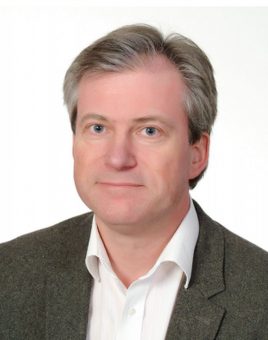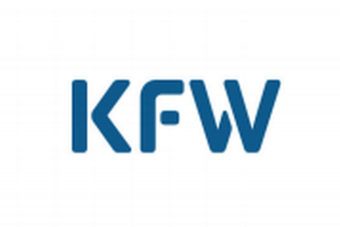
The German Development Bank (KfW) is financially helping Serbia. The investments of KfW bank have reached the level of around 1,711 billion euros, including 887 million euros for the energy sector. These include the production of electricity, coal mines and district heating. Then 251 million euros has been allocated for water supply and 573 million euros for the financial sector. Among first major projects was the rehabilitation of hydro power plants ‘Bajina Bašta’ and ‘Zvornik’ which was financed by the loans in the total amount of 100 million euros.
In the field of production of thermal energy KfW contributes in financing the introduction of the system for controlling the quality of the coal in the largest mining field in Serbia, Kolubara. This is being implemented in cooperation with the European Bank for Reconstruction and Development (EBRD). This new system will significantly affect the reduction of CO2 emission. In addition to these projects which deal with the production of electricity, KfW has also been supporting the projects which deal with energy consumption by providing financing for measures of energy efficiency in public buildings since 2014. KfW has also approved to the Serbian banks the credit lines for refinancing the projects which deal with energy efficiency and renewable energy sources. The financing of the first EPS’s (Elektroprivreda Srbije) wind farm is among the most important future projects.
Energy portal has the honour to talk to Mr. Arne Gooss, General Manager of the KfW bank in Serbia about all these topics.
EP: KfW bank launched the line ‘Green bonds’ in April 2015 and the plan is to invest around a billion euros in the projects in the field of energy efficiency, sustainable transport, renewable energy sources and also in the projects dedicated to waste management in the following 3 to 4 years. What are the results of this initiative which in less than 2 years?

Arne Gooss: The liquidity and the highest quality of the credit line are the factors of success of KfW bonds. As one of the world’s greatest financiers of climate protection, KfW has a holistic approach to sustainability. This also includes work on the capital market. ‘Green Bonds – made by KfW’ make a significant contribution to the promotion and financing of climate and environmental protection measures which are based on the capital market. KfW issued green bonds in the amount of around 1.5 billion of US dollars in November 2016. KfW is also the first participant of the capital market who entered the segment of green bonds, and not only as an issuer but also as an investor.
EP: Climate change is forcing people to mitigation, the change of plan in the business sector, since they change decisions in the last moment and sometimes it results in considerable losses. In what way does the KfW use these facts? How do you create new products and with which institutions do you cooperate with in Europe and Serbia? Do you conduct the research for each country separately?
Arne Gooss: Our goal is to improve the living conditions of people in developing countries and emerging markets and also to improve the economy which supports the environmental protection. The business area of KfW Development Bank and its daughter company DEG which promote the climate and environmental protection, the expansion of public infrastructure and private economic initiative as the drivers of sustainable economy and social progress. KfW has been providing support to Federal German Government in achieving goals in development policies and international cooperation for 50 years. Policy and strategic guidelines of Federal Government therefore serve as the basis for the scope of activities of German Development Bank.
In German financial cooperation, KfW acts as an experienced bank and the institution of development policy. It improves and supports programs and projects on behalf of Federal Government – from the initial idea, through execution, to subsequent assessment of the results. Therefore, KfW also applies the experiences which we gained in improving domestic businesses. The projects have been established in order to motivate future activities, by providing an incentive in the participation of private sector and thus laying the foundation for wider process of transformation.
EP: One of the priorities of KfW bank is to help Serbia to implement targets agreed with the EU within the energy sector in the areas of water supply and waste management. As a proof of that KfW funds projects in the field of renewable energy sources, such as production of electricity from solar energy, wind and hydro potential. From 2005 to 2015 the KfW bank had several large projects in Serbia “European Fund for Serbia” in cooperation with ProCredit Bank, then “Emergency Aid Programme and united energy financial loan” in 2008. During 2010 you realized the project “Rehabilitation of public lighting in Novi Sad, Nis and Belgrade”, and in 2015 you implemented the project “Water Supply Phase I and II”. Do you cooperate with German banks in all these cases? What is the financial value of stated activities and what are your plans in the future in addition to all these?
Arne Gooss: KfW Development Bank supports Serbia on behalf of the BMZ (Federal Ministry of Economic Cooperation and Development). We want to achieve an agreed-upon standard in the energy sector, water supply and water purification, waste management and environmental protection. KfW also supports sustainable economic development in Serbia by offering credit lines for small and medium-sized enterprises (chamber of Commerce and Industry of Serbia), and supports municipalities through a local banking system. Since the establishment of development cooperation in Serbia in 2000, KfW on behalf of Federal Government has approved projects worth 1.7 billion euros. The KfW Bank currently operates in the implementation of projects in more than 25 towns and their utilities.
We cooperate with companies such as EPS and EMS – state-owned companies for the supply of electricity. Through the cooperation with Serbian partner banks we have loan for both small and medium-sized companies and for urban municipalities loans are available throughout the country (for example, to improve energy efficiency in companies and public infrastructure). Initially, due to the then acute needs, KfW financed, on behalf of the German Federal Government, a huge number of assistance programmes – import of electricity, in order to ensure the supply, spare parts for quick maintenance of power plants and district heating system in major cities.

Eventually, projects have become more sophisticated. District heating system has been expanded and now it covers also towns; the benefits of efficiency and environmental impact are becoming increasingly important. The promotion of renewable energy sources has reached the limelight. In new projects, KfW mostly relies on hydro power plants, but also on biomass and wind power plants. The new project of energy efficiency improvement in schools, which is based on the project of World Bank will contribute to reducing energy demand. The same can be said for credit lines which will allow small and medium companies to invest in energy efficiency through the banking sector of Serbia. More than 80 percent of the approved funds were disbursed by the end of 2016. Around 20 percent of funds were provided as the first aid, while the remaining parts were long-term concessional loans.
The future KfW projects, agreed by both Governments, will be focused on three key points of development cooperation in Serbia: the improvement of sustainable development, as well as sustainable infrastructure (energy/energy efficiency, water/ waste water/ solid waste). All these key points contribute to the ‘Initiative for Growth and Development’, which was launched by both Governments at the beginning of 2015. Our future projects and activities will be focused on this initiative, and currently together with our Serbian partners, we are exploring the possibilities how to increase our engagement in the field of energy supply, especially in the sector of renewable energy sources. We are also exploring the possibilities of green credit lines which would be granted through local commercial banks, in order to promote the investments in climate protection conditions, energy efficiency sector and thus in environmental protection.
EP: KfW Bank was established in 1948. It is German Development Bank and during its 70- year existence it has been supporting the energy and industry sectors, both in Germany and also around the world. When did you make the decision to establish the sector which deals with the energy issues, climate change and environmental protection issues?
Arne Gooss: Climate and environmental protection is the tradition of KfW bank. We are the first German development institution which financed environmental protection measures even in 1950s. The bank has had its own environmental improvement and it has established environmental and climate protection as the key point in all areas of improvement since 1984. The first targeted investments in energy efficiency and renewable energy sources were in 1990. Based on this experience, the initiative for energy efficient reconstruction of homes ‘Residential Development, Environment, Development’ was launched in 2006 on behalf of Federal Government. Therefore, KfW supports projects which limit negative effects of climate change. Projects for climate and environmental protection, as well as the ones for adaptation to climate change are often connected with development projects. They are fully in accordance with the agreements signed by the Governments which participated in the United Nations Conference on the Environmental protection and Development in Rio de Janeiro in 1992. For example, the business area of KfW Development Bank provided 975 million of euros, on behalf of the Federal Government, for the projects with the goal of adaptation to climate change in the developing countries and emerging markets only in 2014.
Interview by: Vesna Vukajlović



